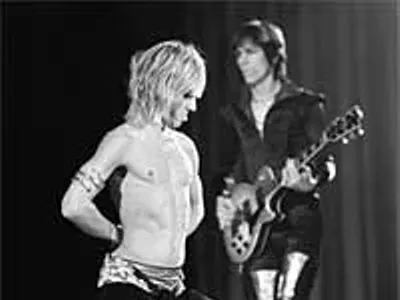
Audio By Carbonatix
[
{
"name": "GPT - Leaderboard - Inline - Content",
"component": "35519556",
"insertPoint": "5th",
"startingPoint": "3",
"requiredCountToDisplay": "3",
"maxInsertions": 100,
"adList": [
{
"adPreset": "LeaderboardInline"
}
]
}
]
While many Detroit area musicians continue to wax poetic about the ’60s, Nick Schillace rhapsodizes about the songs of an older, darker decade.
When asked about his influences, the 35-year-old guitarist, teacher and musicologist name-checks Depression-era country, blues and folk artists like Blind Willie Johnson, Charlie Patton, Blind Lemon Jefferson and the artists on Harry Smith’s Anthology of American Folk Music, particularly the Carter Family.
“Maybelle Carter just takes me apart,” he says. “No matter how much attention she receives, she will always be underrated.”
Looming large over this expansive selection is probably Schillace’s biggest musical inspiration: a man from Takoma Park, Md., who successfully incorporated a modern perspective into this quintessential form of American music.
That man is John Fahey, and his work is a subject Schillace knows well. In 2002, Schillace received a master’s degree in music from Wayne State University, having written his thesis on the late acoustic legend. In his thesis — which is available on his Web site, nickschillace.com — Schillace uses Fahey as a model for a new form of American identity in the 20th century. This identity, he believes, arose largely from the advent of recorded music.
“For Fahey and others like him,” Schillace writes, “recordings served as a means of learning music, forming a folk-like connection to popular culture.” By listening to rare 78 rpm records, Fahey taught himself to play the guitar and “formed a cultivated style that represented the cumulative effect of his influences.” Schillace argues that this two-step process is experienced by many Americans, and is pivotal to the construction of a modern musical identity.
Schillace, however, does much more than analyze music — he creates it. His first solo album, Box Canyon, was released earlier this year on American Sketch Records.
It’s clear Schillace owes a huge debt to his muse. Like Fahey, Schillace performs and composes his instrumental music on a steel-stringed acoustic guitar. He’s also skilled in the technique of finger picking, creating intricate patterns that often sound as though they’re being performed by many musicians. The result is a mature, ruminative record that deftly captures the spirit of Americana.
In addition to his solo work, Schillace also performs in the instrumental group Indoorpark with WDET host John Moshier, and in the old-time duo Big Lake Trawler with Tim Pak. He says he’s constantly energized by these individuals, along with other local musicians he’s performed with.
“I really get inspired by persons who are working to take their creativity out of the comfort of their homes,” Schillace says. “There’s a lot of sacrifice that goes with that and the older I get the more I appreciate the things happening right in front of me.”
In March, he’ll embark on a 10-day trip to California, to perform songs from Box Canyon. Schillace is also set to appear on a compilation with fellow guitarists Mike Tamburo, Keenan Lawler and Ken Camden, which will be released in the spring.
When he’s not making music, Schillace runs Orion Music Studio in Lake Orion, and also conducts lessons from his home in Ferndale.
“Being a musician is sort of a manic existence,” he says. “You’re always struggling, always trying to work things out in your head. It can completely consume your mind.”
Schillace is a man with a mission: to turn people on to instrumental music.
“It’s hard to digest at first, but if you give it some time, the payoff is so much better,” he says. “Many times when I listen to music with lyrics, I feel like they take away from the song because they are so specific and idiosyncratic to the author.
“Instrumental music gives you the chance to draw your own conclusions, to dig deeper into your mind and discover what it is you’re thinking about. I believe that openness of interpretation is so important.”
8 p.m., Friday, Dec. 16, at the Corktown Tavern (1716 Michigan Ave., Detroit) with Page France and Mark James, and at 8-11 p.m., Saturday, Dec. 17, at Raven Coffee House (932 Military St., Port Huron).
Monica Price is a Metro Times editorial intern. Send comments to letters@metrotimes.com




